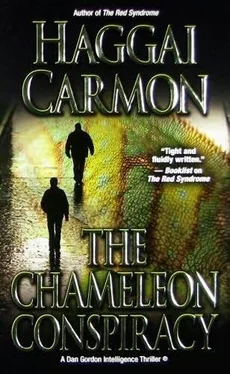Haggai Harmon - The Chameleon Conspiracy
Здесь есть возможность читать онлайн «Haggai Harmon - The Chameleon Conspiracy» весь текст электронной книги совершенно бесплатно (целиком полную версию без сокращений). В некоторых случаях можно слушать аудио, скачать через торрент в формате fb2 и присутствует краткое содержание. Жанр: Триллер, на английском языке. Описание произведения, (предисловие) а так же отзывы посетителей доступны на портале библиотеки ЛибКат.
- Название:The Chameleon Conspiracy
- Автор:
- Жанр:
- Год:неизвестен
- ISBN:нет данных
- Рейтинг книги:5 / 5. Голосов: 1
-
Избранное:Добавить в избранное
- Отзывы:
-
Ваша оценка:
- 100
- 1
- 2
- 3
- 4
- 5
The Chameleon Conspiracy: краткое содержание, описание и аннотация
Предлагаем к чтению аннотацию, описание, краткое содержание или предисловие (зависит от того, что написал сам автор книги «The Chameleon Conspiracy»). Если вы не нашли необходимую информацию о книге — напишите в комментариях, мы постараемся отыскать её.
The Chameleon Conspiracy — читать онлайн бесплатно полную книгу (весь текст) целиком
Ниже представлен текст книги, разбитый по страницам. Система сохранения места последней прочитанной страницы, позволяет с удобством читать онлайн бесплатно книгу «The Chameleon Conspiracy», без необходимости каждый раз заново искать на чём Вы остановились. Поставьте закладку, и сможете в любой момент перейти на страницу, на которой закончили чтение.
Интервал:
Закладка:
“Did they tell you how Kourosh immersed himself in the U.S.?” asked Casey.
Parviz nodded. “In our training class. Although he spoke perfect English, he’d never actually visited the U.S. They wanted us to learn from his mistakes and difficulties.”
I immediately thought about the immersion training at Mossad. Those chosen to be sent into hostile countries were called “combatants,” not agents, and were trained separately from the rest of us, who were intended to become case officers. During a period of preparation that lasted one to three years, most of the combatants were initially sent to a nonhostile third country to familiarize themselves with the country’s daily routines-riding a bus, buying groceries, watching popular TV shows, and reading the sports columns. Only when the controllers were confident that a combatant was ready was he planted in the target country. From what Parviz was describing, it seems that the Iranians weren’t that sophisticated, and had sent Kourosh Alireza Farhadi directly to the U.S. with only a brief stopover in Canada. I now understood why Louis Romano, the drama teacher from Gary, Indiana, had been surprised at the Chameleon’s lack of familiarity with terms that any Wisconsin resident would know.
Still, I had to concede that the Iranians’ mistakes hadn’t harmed their mission much.
“Despite all that, they told us in the update meetings that Farhadi was able to pull off a series of scams, mostly against U.S. banks, eventually exceeding $100 million. The Iranian security-service officers in our camp were elated and said that they had awarded Farhadi with two medals that would be kept in his file until he returned to Tehran.”
“Where were you all this time?”
“In Tehran, working at the headquarters of Atashbon. Rashtian said that my accent was too British.”
I asked Parviz directly, “How did you end up here?”
He shrugged. “I came to think the new regime wasn’t much better than the Shah’s. When I talked about it with my friends, or people I thought were my friends, I was accused of being an infidel and a betrayer of the faith and was expelled from the unit. Within three days I was taken from the camp by military police, drafted into the Iranian army, and sent to the front lines to fight the Iraqis.”
“When was that?”
“It was the end of the war, 1988. It took only two weeks for me to be captured. They held me until not long ago.”
Benny spoke up. “Our agents heard about him from a released prisoner and managed to buy his freedom and smuggle him out of Iraq just before this most recent war. He received political asylum in Israel in return for his cooperation.”
I excused myself and took Benny aside. “Why just now?” I asked Benny in Hebrew. “Where was he all this time?”
“We got him out only recently,” he answered quietly in Hebrew. That meant he’d just finished squeezing out every bit of information available.
“Can he identify all other members of Atashbon?”
“He says he can’t. He says he knew only two others by name. The rest were given code names, and he had never been in the same class with them at the American School.”
I didn’t buy that, but said nothing to Benny. Maybe Benny wanted that information fleshed out later and exchanged when he needed something from the CIA.
“And the two he knew?”
“We’re working on it with Casey.”
We returned to the sofa and joined Morad and Casey. “How many Atashbon members were ultimately sent to the U.S.?” asked Casey. He’d saved the most important question for the end, always a good tactic.
“I was there about eight years,” said Parviz. “I know for a fact that at least eight men were sent from Iran during that period.”
“All to the U.S.?”
“I think so. All were gradually transferred to a third country, mostly in Europe, for a few days, and from there they were sent individually to the U.S.”
“But you don’t have their names?”
“No. Other than the two I remembered from school, the rest were strangers. It was all extremely secretive. We were forbidden to use our real names and were given new Iranian names. I got so used to my new name that I sometimes get confused and still use it, although it’s been many years now.”
“And do you remember any real names of the members?” asked Casey.
“Just one.”
“And who was that?”
“Alec Simmons.”
“Anything else about him?”
“I don’t know. I’ve never seen Alec Simmons, I only heard of him. He was the second or the third catch of Rashtian.”
“Do you know anything about the person who assumed his identity?”
“His new Iranian name was Ibrahim Soleimani. I have no idea what his real name is.”
Casey intervened. “Do you know anything about him at all?” He was becoming impatient and dismissive.
“Very little. Although we lived together in the camp, we were forbidden to talk about our past. Once, one of us was overheard telling his friend about his grandfather. He was punished severely.”
“Meaning…?” Casey pressed harder.
“He was lashed, before all of us.”
“What did Ibrahim Soleimani look like?” I resumed control of the questioning.
“Well, it has been eighteen years. But back then he was chubby. He was five foot eight and weighed, to my estimate, two hundred and fifty pounds. Black hair and eyes.”
“Any special physical markings?”
“I don’t remember anything special about him. He spoke very good English and had a nice sense of humor. We were lucky to be living in Tehran under reasonable conditions, while others our age were fighting the Iraqis in the desert trenches. So we kept our mouths shut and obeyed our superiors.”
I continued interviewing Morad for two more hours until an aide to Benny arrived and took Morad with him.
“This is a transcript of his interrogation in Israel,” said Benny as he handed me a bound copy. “It can’t leave this place.” He showed me to another room with a desk and a sofa. “Here you can read and take notes. Avoid copying telltale sentences.”
“Do you trust him?” I asked Benny.
He gave me that look reserved for those born stupid who live to demonstrate it daily.
“Are you kidding? We use him as an intelligence source only, and not a very reliable one either. Read his story with a huge grain of salt.”
Casey’s mobile phone rang. Before moving to an adjacent room to take the call he told me that a Mossad veteran named Reuven would instruct me on Iranian customs and daily life on the following day.
After Benny and Casey left the safe apartment, I spent most of the evening and some of the night reading the transcript of Morad’s interrogation. I woke up on the sofa in the morning clutching the notebook, and gave it to a woman who’d politely asked me to return it to her.
I went back to my hotel for a change of clothes, and then walked in the chilly Vienna air to another safe apartment to meet Reuven. That safe apartment was located in a prewar building, just a few blocks from my hotel.
I rang the bell. A fifty-something woman with a sour face opened the door.
“Ja?”
“Ich bin Ian Pour Laval. Ich werde erwartet hier.” I’m Ian Pour Laval, I’m expected here.
She opened the door wider and let me in. I found myself in a big room with a high ceiling and a tall wooden door leading to other rooms. The apartment was sparsely decorated and had only minimal furniture. A long table with two computer monitors stood across the room, and an easel was next to the wall. I waited for the woman to say something, but she didn’t. She opened the door to an adjoining room and left. I just stood there. A moment later the inside door opened and a dark-skinned man with white hair appeared.
Читать дальшеИнтервал:
Закладка:
Похожие книги на «The Chameleon Conspiracy»
Представляем Вашему вниманию похожие книги на «The Chameleon Conspiracy» списком для выбора. Мы отобрали схожую по названию и смыслу литературу в надежде предоставить читателям больше вариантов отыскать новые, интересные, ещё непрочитанные произведения.
Обсуждение, отзывы о книге «The Chameleon Conspiracy» и просто собственные мнения читателей. Оставьте ваши комментарии, напишите, что Вы думаете о произведении, его смысле или главных героях. Укажите что конкретно понравилось, а что нет, и почему Вы так считаете.












